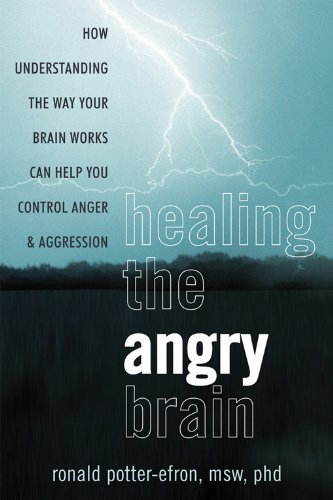 Reddit reviews Healing the Angry Brain: How Understanding the Way Your Brain Works Can Help You Control Anger and Aggression
Reddit reviews Healing the Angry Brain: How Understanding the Way Your Brain Works Can Help You Control Anger and Aggression
We found 2 Reddit comments about Healing the Angry Brain: How Understanding the Way Your Brain Works Can Help You Control Anger and Aggression. Here are the top ones, ranked by their Reddit score.

Sounds like you're living in an anger cycle: something happens which causes negative emotions to arise (anger, annoyance, resentment, disillusionment, etc.), and your immediate response is to want to break things or just go off the wall to get your aggression out. Then, afterwards, you feel guilty about what you did and you tell yourself you'll do better next time. It's very much akin to an addiction.
What you need to do is retrain your brain. I mean that literally: rewire your brain. You can achieve this through forcing yourself to see the irrationality of your actions. For example, let's say you're driving down the street and someone cuts you off. Your initial emotion is rage: you hate that they ignored you and you feel slighted. What you need to do in that moment is start challenging your rage. Ask yourself the following questions:
You need to read a great book titled Healing the Angry Brain. Here's a tl;dr of the book:
When your brain receives a stimulus, the signal goes to your frontal lobe (the part of your brain responsible for critical thinking and reasoning) and your amygdala (the part of your brain responsible for initiating the fight-or-flight response). Both of these parts of your brain duel to determine the response; your frontal lobe wants to be a gentleman, and your amygdala wants to be a caveman. If you respond to everyday situations with rage too often, your amygdala starts winning every duel, making it more likely you'll respond with anger in the future. BUT, the great part is our brains are very resilient, efficient, and progressive in that our brains have the capacity to rewire themselves. If you start forcing yourself to remain calm in situations when you previously got mad, your frontal lobe starts to win its duel with the amygdala and you remain calm more frequently.
I'm living proof the brain can rewire itself in this way. I walked around with an underlying rage problem most of my life. I lived in 4 apartments between the ages of 20-26 and at some point I punched a hole in the wall of each of those apartments. I used to get so angry about the smallest things that I'd have fantasies about punching people until they were dead. When I turned 28 I started to realize that I was the angriest person on earth and my anger only ever made my life miserable. I'm 31 now and I'm one of the most laid-back people you'd ever meet. I hardly ever get mad about anything - and it's all because of that book and my choice to constantly challenge my anger literally every 5 minutes for months.
You can do it, man. You can improve yourself. Buy that book, read it, and start changing your brain. If you can, see a counselor as well because it's great for mental health.
It sounds to me like the meditation is working. Meditation is designed to help us feel our present experience fully. Frustration is an emotion, and if you are feeling it in meditation, its probably an emotion that you feel often. First, dis-identify from it. This means instead of saying "I'm so frustrated!", say "There is frustration in me." Next, observe it with open curiosity. Let go of the idea that you should feel tranquil. Instead, feel what you feel and watch it.
I think the idea that meditation is about feeling tranquil is one of the key misperceptions about meditation. People think that, if they just sit and breathe, then, automatically, they won't feel stress anymore, they won't feel "bad" emotions or "bad" thoughts, or they won't feel pain. These things are part of life and they never go away completely. Meditation is all about consistent practice. As the meditator gets better at concentrating on and accepting the present (no matter how hard or emotional it is), they begin to feel the burden of their pain less - they are more aware of how they cause themselves pain and they no longer perpetuate it.
This book is not about meditation. But if you are at all a science-minded person, and are interested in how emotions operate in your body, then read Healing the Angry Brain. I found it to be very interesting.
Good luck with your meditation.